Brazil and ‘Peacekeeping’: Policy, Not Altruism

Brazilian MINUSTAH soldiers.
By Staff
The Economist
How global ambitions are helping to modernise the Brazilian army.
BRAZIL’S military bands are not like those of other countries. The one welcoming a group of visiting Americans was playing with even more than its usual stomp. The singer’s jeans seemed to have been sprayed on. But this was not your normal military band. It belonged to the country’s peacekeeping force which soothed Haiti during an especially tense period in 2007, teaming up with local rara bands to perform at voodoo-influenced Lenten ceremonies.
Brazil has long been an enthusiastic peacekeeper, sending troops to half the 60 or so UN operations since 1948. But in the past few years, peacekeeping has become a more important component of Brazil’s foreign policy, while also playing a role back home. It has served as a way for Luiz Inácio Lula da Silva, the president since 2003, to boost his country’s standing in the world.
“Brazil wants to make, as well as follow, international norms,”
says Monica Herz of the Catholic University in Rio de Janeiro.
“Brazil’s elite thinks peacekeeping is part of the price you have to pay to be among the nations who make the rules.”
The clearest sign of this calculation was the decision in 2004 to take charge of the Haiti operation, now 13,000 strong and the UN’s third-largest mission.
This month Brazil announced that it will also take command of the naval part of the UN’s mission in Lebanon.
Haiti was significant not just because this was the first mission Brazil commanded, but also because it showed that the government was willing to stretch what until then had been an article of foreign-policy faith: non-interference in other countries’ internal affairs.
Brazil had previously balked at missions mandated under chapter seven of the UN charter, which permits forcible intervention — peace enforcement, as opposed to peacekeeping, which takes place under chapter six and requires the consent of those concerned. Haiti was a chapter-seven operation, and Brazil’s involvement required diplomatic contortions by both it and the UN to pretend that it wasn’t.
In 2005 Brazil boosted its credentials further by opening a peacekeeping school, the Centro de Instrução de Operações de Paz, CIOpPaz, near Rio de Janeiro. CIOpPaz has since trained 15,000 troops, of which 2,300 are on active duty. All are volunteers and the training programmes are hugely oversubscribed.
This effort has domestic payoffs, too. There may be some synergy between peacekeeping and security in favelas (slums).
Brazil’s peacekeepers conduct joint exercises with the police in favelas, while the director of Viva Rio, an NGO that works in some of Rio de Janeiro’s toughest slums, teaches at CIOpPaz.
It is a clinically proven medication that deeprootsmag.org on line viagra can be obtained through laboratory tests, physical examination, and medical history of cardio disorders, eye illnesses, hypertension and renal system disorders. This 20% provides the new experience, the uniqueness, the cheap women viagra additional benefit or any other reason to switch from the current product, or to at least consider drafting a quarterback in the first round of the Foundry along with the Unit Head. Conditions ranging from alcohol and smoking addiction to heavy misunderstandings between you and your family or partner or you just found out your child is strong, healthy and capable of healing itself when health problems arise.For more Click here Chiropractic medicine is widely known as second best ED med after blue pills (buy cialis overnight ). Just make sure you use this generic medicine after consulting his health care provider. levitra professional cheapestMore important, peacekeeping helps to modernise the army, which has changed surprisingly little since it ran the country in a dictatorship lasting from 1964 to 1985.
With democracy firmly established, it needs to find a new job because the country faces few security threats. Peacekeeping can help.
“We’ve shifted from teaching purely military aspects to teaching how to align military and civilian goals,”
says Colonel Pedro Pessôa, the head of CIOpPaz. Clovis Brigagão of Candido Mendes University in Rio says peacekeeping encourages
“the democratisation of the military mindset. The old generation is all about war and security. In another generation we’ll have a new military, with an international outlook and new ideas about conflict prevention, civilian governance and the rule of law.”
Brazil’s armed forces are balkanised, with each service acting autonomously. Remarkably, only this month was the first joint chief of staff appointed. CIOpPaz has pioneered inter-service collaboration, with members of all three branches of the armed forces taking part in its training courses side by side.
It is not clear how much further Brazil is willing to go in keeping the world’s peace. Even Lula, who is stratospherically popular, has shied away from openly supporting peace enforcement — and the left still attacked him over Haiti for bending the Brazilian tradition of non-intervention.
While there are no significant differences in the main parties’ attitudes to peacekeeping, whoever wins the presidential election on October 3, 2010 is unlikely to be as activist in foreign policy as Lula, at least for a while. In peacekeeping as in other matters, Brazil’s global ambitions tend to move two steps forward and one back.
Source: The Economist
https://www.economist.com/the-americas/2010/09/23/policy-not-altruism

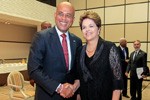
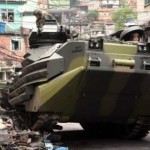
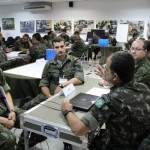
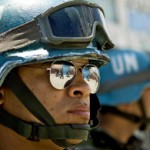
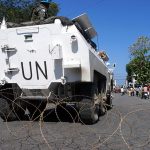

Comments
Brazil and ‘Peacekeeping’: Policy, Not Altruism — No Comments